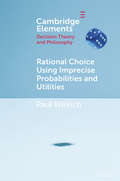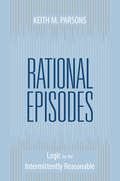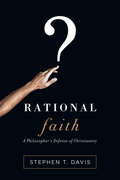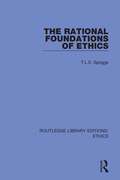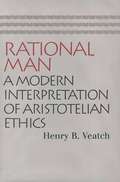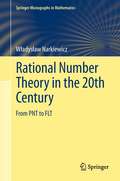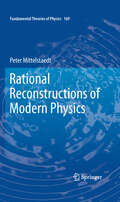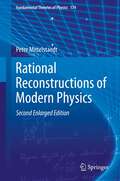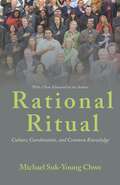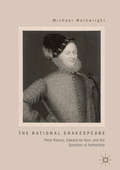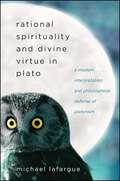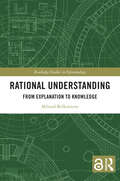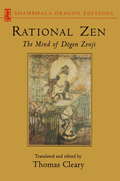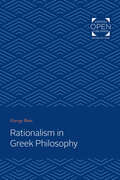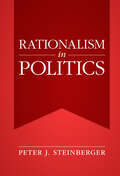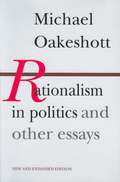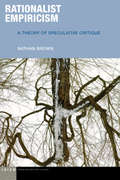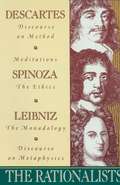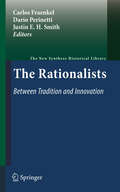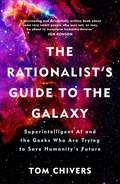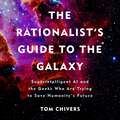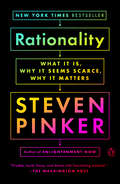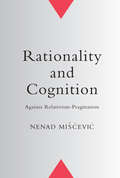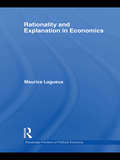- Table View
- List View
Rational Choice Using Imprecise Probabilities and Utilities (Elements in Decision Theory and Philosophy)
by Paul WeirichAn agent often does not have precise probabilities or utilities to guide resolution of a decision problem. I advance a principle of rationality for making decisions in such cases. To begin, I represent the doxastic and conative state of an agent with a set of pairs of a probability assignment and a utility assignment. Then I support a decision principle that allows any act that maximizes expected utility according to some pair of assignments in the set. Assuming that computation of an option's expected utility uses comprehensive possible outcomes that include the option's risk, no consideration supports a stricter requirement.
Rational Decision and Causality
by Ellery EellsFirst published in 1982, Ellery Eells' original work on rational decision making had extensive implications for probability theorists, economists, statisticians and psychologists concerned with decision making and the employment of Bayesian principles. His analysis of the philosophical and psychological significance of Bayesian decision theories, causal decision theories and Newcomb's paradox continues to be influential in philosophy of science. His book is now revived for a new generation of readers and presented in a fresh twenty-first-century series livery, including a specially commissioned preface written by Brian Skyrms, illuminating its continuing importance and relevance to philosophical enquiry.
Rational Episodes: Logic For The Intermittently Reasonable
by Keith M. ParsonsLogic is the skill that enables humans to think clearly, accurately, and rigorously and so to draw only the inferences that the evidence warrants. Some people, like scientists, engineers, mathematicians, and computer programmers, get plenty of on-the-job practice in thinking logically. The rest of us generally don’t.In this accessible, concise yet comprehensive introduction to a sometimes-formidable subject, philosopher Keith Parsons presents elementary topics in logic for people who have little background in mathematics or science and have no career goals in those fields. Parsons presupposes no specialized background and strives to introduce even abstract concepts in an intuitive and unintimidating way. His informal, conversational style leads the reader painlessly, even entertainingly, through three essential areas of logic. The first part of the book deals with sentential and predicate logic, as well as inductive and scientific reasoning, including inference to the best explanation. The second part explains basic probability, Bayes’ Theorem, and why thinking about probability is so prone to error and illusion. The third part considers informal reasoning and critical thinking, including such topics as rhetoric, fallacies, political spin, and the detection of pseudoscience and pseudohistory.Why be logical? Even if you’re a poet, an artist, or just a free spirit, logic can help you determine the facts behind the political propaganda, religious claims, advertising, and sales talk that we are all subjected to. As a logically literate person, you will be a better-informed citizen, wiser consumer, and a clearer thinker.
Rational Faith: A Philosopher's Defense of Christianity (Veritas Books)
by Stephen T. DavisWhy believe in God?
The Rational Foundations of Ethics
by T. L. SpriggeOriginally published in 1988, this landmark study develops its own positive account of the nature and foundations of moral judgement, while at the same time serving as a guide to the range of views on the matter which have been given in modern western philosophy. The book addresses itself to two main questions: Can moral judgements be true or false in that fundamental sense in which a true proposition is one which describes things as they really are? Are rational methods available in ethics which can be expected to produce convergence on shared moral views on the part of those who use them intelligently?
Rational Man: A Modern Interpretation Of Aristotelian Ethics
by Henry Babcock Veatch Douglas B. RasmussenForty years after its original publication, Liberty Fund brings back to print Henry Veatch's path-breaking popular presentation of virtue ethics. This modern interpretation of Aristotelian ethics is a natural for undergraduate philosophy courses. It is also an engaging work for the expert and the beginner alike, offering a middle ground between existential and analytic ethics. Veatch argues for the existence of ethical knowledge, and he reasons that this knowledge is grounded in human nature. Yet he contends that the moral life is not merely one of following rules or recipes, nor is human well-being something simple. Rather, the moral life, which Veatch calls #147;rational or intelligent living," is the life of practical wisdom where individual judgment of the particular and the contingent is paramount. Veatch's Rational Man offers a pluralistic understanding of human well-being without lapsing into moral relativism. For those interested in morality and liberty, Rational Man offers fertile ground for developing an account of free and responsible persons. It has profoundly influenced the work of Den Uyl, Campbell, Machan, Miller, Mack, and many others. Henry Babcock Veatch (1911#150;1999) was born in Evansville, Indiana, and educated at Harvard. He was recognized as one of the leading neo-Aristotelian philosophers of the twentieth century. Besides Rational Man, he was the author of Intentional Logic; Realism and Nominalism Revisited; Aristotle: A Contemporary Appreciation; and many others.
Rational Number Theory in the 20th Century
by Władysław NarkiewiczThe last one hundred years have seen many important achievements in the classical part of number theory. After the proof of the Prime Number Theorem in 1896, a quick development of analytical tools led to the invention of various new methods, like Brun's sieve method and the circle method of Hardy, Littlewood and Ramanujan; developments in topics such as prime and additive number theory, and the solution of Fermat's problem. Rational Number Theory in the 20th Century: From PNT to FLT offers a short survey of 20th century developments in classical number theory, documenting between the proof of the Prime Number Theorem and the proof of Fermat's Last Theorem. The focus lays upon the part of number theory that deals with properties of integers and rational numbers. Chapters are divided into five time periods, which are then further divided into subject areas. With the introduction of each new topic, developments are followed through to the present day. This book will appeal to graduate researchers and student in number theory, however the presentation of main results without technicalities will make this accessible to anyone with an interest in the area.
Rational Reconstructions of Modern Physics
by Peter MittelstaedtNewton’s classical physics and its underlying ontology are loaded with several metaphysical hypotheses that cannot be justified by rational reasoning nor by experimental evidence. Furthermore, it is well known that some of these hypotheses are not contained in the great theories of modern physics, such as the theory of relativity and quantum mechanics. This book shows that, on the basis of Newton’s classical physics and by rational reconstruction, the theory of relativity as well as quantum mechanics can be obtained by partly eliminating or attenuating the metaphysical hypotheses. Moreover, it is shown that these reconstructions do not require additional hypotheses or new experimental results.
Rational Reconstructions of Modern Physics, 2nd Enlarged Edition
by Peter MittelstaedtNewton's classical physics and its underlying ontology are loaded with several metaphysical hypotheses that cannot be justified by rational reasoning nor by experimental evidence. Furthermore, it is well known that some of these hypotheses are not contained in the great theories of Modern Physics, such as the theory of Special Relativity and Quantum Mechanics. This book shows that, on the basis of Newton's classical physics and by rational reconstruction, the theory of Special Relativity as well as Quantum Mechanics can be obtained by partly eliminating or attenuating the metaphysical hypotheses. Moreover, it is shown that these reconstructions do not require additional hypotheses or new experimental results. <P><P> In the second edition the rational reconstructions are completed with respect to General Relativity and Cosmology. In addition, the statistics of quantum objects is elaborated in more detail with respect to the rational reconstruction of quantum mechanics. The new material completes the approach of the book as much as it is possible at the present state of knowledge. Presumably, the most important contribution that is added to the second edition refers to the problem of interpretation of the three great theories of Modern Physics. It is shown in detail that in the light of rational reconstructions even realistic interpretations of the three theories of Modern Physics are possible and can easily be achieved.
Rational Ritual: Culture, Coordination, and Common Knowledge
by Michael Suk-Young ChweWhy do Internet, financial service, and beer commercials dominate Super Bowl advertising? How do political ceremonies establish authority? Why does repetition characterize anthems and ritual speech? Why were circular forms favored for public festivals during the French Revolution? This book answers these questions using a single concept: common knowledge. Game theory shows that in order to coordinate its actions, a group of people must form "common knowledge." Each person wants to participate only if others also participate. Members must have knowledge of each other, knowledge of that knowledge, knowledge of the knowledge of that knowledge, and so on. Michael Chwe applies this insight, with striking erudition, to analyze a range of rituals across history and cultures. He shows that public ceremonies are powerful not simply because they transmit meaning from a central source to each audience member but because they let audience members know what other members know. For instance, people watching the Super Bowl know that many others are seeing precisely what they see and that those people know in turn that many others are also watching. This creates common knowledge, and advertisers selling products that depend on consensus are willing to pay large sums to gain access to it. Remarkably, a great variety of rituals and ceremonies, such as formal inaugurations, work in much the same way. By using a rational-choice argument to explain diverse cultural practices, Chwe argues for a close reciprocal relationship between the perspectives of rationality and culture. He illustrates how game theory can be applied to an unexpectedly broad spectrum of problems, while showing in an admirably clear way what game theory might hold for scholars in the social sciences and humanities who are not yet acquainted with it. In a new afterword, Chwe delves into new applications of common knowledge, both in the real world and in experiments, and considers how generating common knowledge has become easier in the digital age.
The Rational Shakespeare: Peter Ramus, Edward de Vere, and the Question of Authorship
by Michael WainwrightThe Rational Shakespeare: Peter Ramus, Edward de Vere, and the Question of Authorship examines William Shakespeare’s rationality from a Ramist perspective, linking that examination to the leading intellectuals of late humanism, and extending those links to the life of Edward de Vere, Seventeenth Earl of Oxford. The application to Shakespeare’s plays and sonnets of a game-theoretic hermeneutic, an interpretive approach that Ramism suggests but ultimately evades, strengthens these connections in further supporting the Oxfordian answer to the question of Shakespearean authorship.
Rational Spirituality and Divine Virtue in Plato: A Modern Interpretation and Philosophical Defense of Platonism
by Michael LaFargueMichael LaFargue presents an important and accessible aspect of Plato's legacy largely overlooked today: a variety of personal spirituality based on reason and centered on virtue. Plato's Virtue-Forms are transcendent in their goodness, ideals that Platonists can use to improve character and become like God so far as is humanly possible. LaFargue constructs a model of inductive Socratic reasoning capable of acquiring knowledge of these perfect Virtue-Forms, then scales back claims about these Forms to what can be supported by this kind of reasoning. This is a critical theory, but also a pluralistic one that accommodates modern cultural diversity. A how-to chapter provides detailed descriptions of the rules of Socratic reasoning basic to this spirituality, which any interested individual can practice today. LaFargue supports his interpretation by a close reading of the Greek text of key passages in Plato's dialogues. The work also undertakes a broader philosophical consideration, discussing the philosophical foundations proposed for this Platonism in relation to the thought of G. E. Moore, Ludwig Wittgenstein, Martin Heidegger, Friedrich Nietzsche, and Richard Rorty.
Rational Understanding: From Explanation to Knowledge (Routledge Studies in Epistemology)
by Miloud BelkonieneThis book develops a novel account of the connections between justification, understanding and knowledge. It lays the foundation for a more systematic and interconnected treatment of these central notions in epistemology. The author’s key move is to show first that a specific conception of doxastic justification constitutes our best point of entry into questions pertaining to a subject’s ability to secure understanding of reality. Second, that the traditional order of analysis when it comes to the connection between understanding and knowledge should be reversed: knowledge itself is best conceived of in terms of a specific type of understanding. Rational Understanding will appeal to scholars and advanced students working in epistemology and philosophy of science.
Rational Zen: The Mind of Dogen Zenji
by Thomas ClearyZen has often been portrayed as being illogical and mystifying, even aimed at the destruction of the rational intellect. These new translations of the thirteenth-century Zen master Dogen--one of most original and important Zen writers--illustrate the rational side of Zen, which has been obscured through the centuries, tainting people's understanding of it. Rational Zen consists of enlightening selections from Dogen's two masterworks, "Treasury of Eyes of True Teaching" (the famed Shobogenzo, Japan's most sophisticated philosophical work) and "Universal Book of Eternal Peace," which until now has been unavailable in English. The translator also provides explanations of the inner meanings of Dogen's writings and sayings--the first commentaries of their kind of English. A compendium of authentic source materials further enhances the reader's insight into Dogen's methods, linking them to the great classical traditions of Buddhism that ultimately flowered in Zen.
Rationalism in Greek Philosophy
by George BoasOriginally published in 1961. Greek philosophers were concerned with the distinction between appearance and reality, and all the differences in their philosophic systems were ultimately predicated on their different views of this distinction. The history of Greek rationalism is, then, a study of the changing basis of Greek philosophy. George Boas provides a historical account of rationalism in classical philosophy. He focuses on four central topics: the distinction between appearance and reality, the method used to establish the distinction, the appraisal of life made by the philosophers studied, and their ethical theories.
Rationalism in Politics
by Peter J. SteinbergerArguing against emergent and even dominant tendencies of recent political thought that emphasize the so-called primacy of affect, Peter Steinberger challenges political theorists to take account of important themes in philosophy on the topic of human rationality. He engages with major proponents of post-Kantian thought, analytic and continental alike, to show how political judgment and political action, properly understood, are deeply and definitively grounded in considerations of human reason. Focusing especially on influential arguments in the philosophy of mind and the philosophy of action, he seeks to rediscover and reanimate the close connection between systematic philosophical speculation on the one hand and the theory and practice of politics on the other. The result is a neo-rationalist conception of judgment and action that promises to offer a substantial and compelling account of political enterprise as it plays out in the real world of public affairs.
Rationalism in Politics and Other Essays
by Michael OakeshottRationalism in Politics, first published in 1962, has established the late Michael Oakeshott as the leading conservative political theorist in modern Britain. This expanded collection of essays astutely points out the limits of "reason" in rationalist politics. Oakeshott criticizes ideological schemes to reform society according to supposedly "scientific" or rationalistic principles that ignore the wealth and variety of human experience. "Rationalism in politics," says Oakeshott, "involves a misconception with regard to the nature of human knowledge. " History has shown that it produces unexpected, often disastrous results. "Having cut himself off from the traditional knowledge of his society, and denied the value of any education more extensive than a training in a technique of analysis," the Rationalist succeeds only in undermining the institutions that hold civilized society together. In this regard, rationalism in politics is "a corruption of the mind. "
Rationalist Empiricism: A Theory of Speculative Critique (Idiom: Inventing Writing Theory)
by Nathan BrownTwenty-first-century philosophy has been drawn into a false opposition between speculation and critique. Nathan Brown shows that the key to overcoming this antinomy is a re-engagement with the relation between rationalism and empiricism. If Kant’s transcendental philosophy attempted to displace the opposing priorities of those orientations, any speculative critique of Kant will have to re-open and consider anew the conflict and complementarity of reason and experience. Rationalist Empiricism shows that the capacity of reason and experience to extend and yet delimit each other has always been at the core of philosophy and science. Coordinating their discrepant powers, Brown argues, is what enables speculation to move forward in concert with critique.Sweeping across ancient, modern, and contemporary philosophy, as well as political theory, science, and art, Brown engages with such major thinkers as Plato, Descartes, Hume, Hegel, Marx, Heidegger, Bachelard, Althusser, Badiou, and Meillassoux. He also shows how the concepts he develops illuminate recent projects in the science of measurement and experimental digital photography. With conceptual originality and argumentative precision, Rationalist Empiricism reconfigures the history and the future of philosophy, politics, and aesthetics.
The Rationalists: Descartes, Spinoza, Leibniz
by Rene Descartes Gottfried Wilhelm Leibniz Benedict De SpinozaFounded in the mid-17th century, Rationalism was philosophy's first step into the modern era. This volume contains the essential statements of Rationalism's three greatest figures: Descartes, who began it; Spinoza, who epitomized it; and Leibniz, who gave it its last serious expression.
The Rationalists: Between Tradition and Innovation
by Justin E. Smith Dario Perinetti Carlos FraenkelThis volume draws a balanced picture of the Rationalists by bringing their intellectual contexts, sources and full range of interests into sharper focus, without neglecting their core commitment to the epistemological doctrine that earned them their traditional label. The collection of original essays addresses topics ranging from theodicy and early modern music theory to Spinoza's anti-humanism, often critically revising important aspects of the received picture of the Rationalists. Another important contribution of the volume is that it brings out aspects of Rationalist philosophers and their legacies that are not ordinarily associated with them, such as the project of a Cartesian ethics. Finally, a strong emphasis is placed on the connection of the Rationalists' philosophy to their interests in empirical science, to their engagement in the political life of their era, and to the religious background of many of their philosophical commitments.
The Rationalist's Guide to the Galaxy: Superintelligent AI and the Geeks Who Are Trying to Save Humanity's Future
by Tom Chivers'A fascinating and delightfully written book about some very smart people who may not, or may, be about to transform humanity forever' JON RONSON'Beautifully written, and with wonderful humour, this is a thrilling adventure story of our own future' LEWIS DARTNELL, author of THE KNOWLEDGE and ORIGINSAre paperclips going to destroy life as we know it?What can Mickey Mouse teach us about how to programme AI?Could a more rational approach to life be what saves us all?This is a book about about a community of people who are trying to think rationally about intelligence and what insight they can and can't give us about the future of the human race. It explains why these people are worried about an AI apocalypse, why they might be right, and why they might be wrong. It is a book about the cutting edge of our thinking on intelligence and rationality right now by the people who stay up all night worrying about it.
The Rationalist's Guide to the Galaxy: Superintelligent AI and the Geeks Who Are Trying to Save Humanity's Future
by Tom Chivers'A fascinating and delightfully written book about some very smart people who may not, or may, be about to transform humanity forever' JON RONSON'The AI does not hate you, nor does it love you, but you are made of atoms which it can use for something else'This is a book about AI and AI risk. But it's also more importantly about a community of people who are trying to think rationally about intelligence, and the places that these thoughts are taking them, and what insight they can and can't give us about the future of the human race over the next few years. It explains why these people are worried, why they might be right, and why they might be wrong.It isn't, on the other hand, a book about the future - it doesn't try to guess how many of us are going to be put out of work by AI, or what the operating system in your house might be able to do ten years hence. Instead, this is a book about the cutting edge of our thinking on intelligence and rationality right now by the people who stay up all night worrying about it.Along the way, we discover why we probably don't need to worry about a future AI resurrecting a perfect copy of our minds and torturing us for not inventing it sooner but we should be concerned about paperclips destroying life as we know it; how Mickey Mouse can teach us an important lesson about how to programme AI; and why Spock is not as logical as we think he is.(p) Orion Publishing Group Ltd 2019
Rationality: What It Is, Why It Seems Scarce, Why It Matters
by Steven PinkerCan reading a book make you more rational? Can it help us understand why there is so much irrationality in the world? Steven Pinker, author of Enlightenment Now (Bill Gates’s "new favorite book of all time”) answers all the questions here. <p><p> Today humanity is reaching new heights of scientific understanding--and also appears to be losing its mind. How can a species that developed vaccines for Covid-19 in less than a year produce so much fake news, medical quackery, and conspiracy theorizing? Pinker rejects the cynical cliché that humans are simply irrational--cavemen out of time saddled with biases, fallacies, and illusions. After all, we discovered the laws of nature, lengthened and enriched our lives, and set out the benchmarks for rationality itself. <p><p> We actually think in ways that are sensible in the low-tech contexts in which we spend most of our lives, but fail to take advantage of the powerful tools of reasoning we’ve discovered over the millennia: logic, critical thinking, probability, correlation and causation, and optimal ways to update beliefs and commit to choices individually and with others. These tools are not a standard part of our education, and have never been presented clearly and entertainingly in a single book--until now. <p><p> Rationality also explores its opposite: how the rational pursuit of self-interest, sectarian solidarity, and uplifting mythology can add up to crippling irrationality in a society. Collective rationality depends on norms that are explicitly designed to promote objectivity and truth. Rationality matters. It leads to better choices in our lives and in the public sphere, and is the ultimate driver of social justice and moral progress. Brimming with Pinker’s customary insight and humor, Rationality will enlighten, inspire, and empower.
Rationality and Cognition
by Nenad MiscevicCognitive science has posed some radical challenges to philosophy in recent years, particularly in the study of the cognitive activities and capacities of individuals. Many philosophers have taken up the challenge, and one result has been the emergence of a radical new wave of relativism, one that assaults the credibility of rationalist views. In this book Nenad Mis c evic defends naturalistic rationalism against these recent relativist attacks.The book begins with an excellent introduction to cognitive science, and goes on to create a searching defence of human rationality and of a traditional role for truth in epistemology. Mis c evic presents a critical scrutiny of the relativism championed by Stephen Stich and Paul Churchland and their followers, showing that it not only exaggerates the subversive impact of science, but relies on its links with naturalism for much of its crediblity. His careful dissection of relativist arguments establishes the main outlines of a positive rationalistic picture that is both original and convincing.
Rationality and Explanation in Economics (Routledge Frontiers Of Political Economy Ser.)
by Maurice LagueuxEconomical questions indisputably occupy a central place in everyday life. In order to clarify these questions, people generally turn to those who are familiar with economics. In answering such legitimate questions, economists propose explanations which rest on a few principles among which the rationality principle is by far the most fundamental. This principle assumes that people are rational, but what is meant by this has to be specified. Rationality and Explanation in Economics claims that only a minimal kind of rationality is required to ‘animate’ economic explanations. However, such a conception of rationality faces serious objections: it is closely associated with harshly criticised methodological individualism and it is not easily disentangled from sheer irrationality. The book answers these objections and shows that the economists’ way of mobilising the concepts of maximization or of consistency for defining rationality raises more serious problems. Since the latter have encouraged various attempts to downgrade or even to dispense with the very notion of rationality, the book is largely devoted to countering arguments associated with these attempts and to show why postulating that agents are rational is still the only efficient way to explain economic phenomena as such. The author also proposes original views about the role of rationality, the meaning of methodological individualism, the relevance of the selection argument and the relation between ‘rational’ explanations of economics and explanations in natural sciences.
